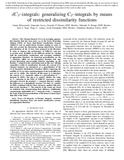Mostrar el registro sencillo del ítem
dCF-integrals: generalizing CF-integrals by means of restricted dissimilarity functions
| dc.creator | Wieczynski, Jonata | es_ES |
| dc.creator | Lucca, Giancarlo | es_ES |
| dc.creator | Pereira Dimuro, Graçaliz | es_ES |
| dc.creator | Borges, Eduardo N. | es_ES |
| dc.creator | Sanz Delgado, José Antonio | es_ES |
| dc.creator | Asmus, Tiago | es_ES |
| dc.creator | Fernández Fernández, Francisco Javier | es_ES |
| dc.creator | Bustince Sola, Humberto | es_ES |
| dc.date.accessioned | 2023-02-13T11:44:05Z | |
| dc.date.available | 2023-06-17T23:00:13Z | |
| dc.date.issued | 2022 | |
| dc.identifier.citation | Wieczynski, J., Lucca, G., Dimuro, G. P., Borges, E. N., Sanz, J. A., Asmus, T. da C., Fernandez, J., & Bustince, H. (2023). dc_{f}-integrals: Generalizing c_{f}-integrals by means of restricted dissimilarity functions. IEEE Transactions on Fuzzy Systems, 31(1), 160-173. https://doi.org/10.1109/TFUZZ.2022.3184054 | en |
| dc.identifier.issn | 1063-6706 | |
| dc.identifier.uri | https://hdl.handle.net/2454/44684 | |
| dc.description.abstract | The Choquet integral (CI) is an averaging aggregation function that has been used, e.g., in the fuzzy reasoning method (FRM) of fuzzy rule-based classification systems (FRBCSs) and in multicriteria decision making in order to take into account the interactions among data/criteria. Several generalizations of the CI have been proposed in the literature in order to improve the performance of FRBCSs and also to provide more flexibility in the different models by relaxing both the monotonicity requirement and averaging conditions of aggregation functions. An important generalization is the CF -integrals, which are preaggregation functions that may present interesting nonaveraging behavior depending on the function F adopted in the construction and, in this case, offering competitive results in classification. Recently, the concept of d-Choquet integrals was introduced as a generalization of the CI by restricted dissimilarity functions (RDFs), improving the usability of CIs, as when comparing inputs by the usual difference may not be viable. The objective of this article is to introduce the concept of dCF -integrals, which is a generalization of CF -integrals by RDFs. The aim is to analyze whether the usage of dCF -integrals in the FRM of FRBCSs represents a good alternative toward the standard CF -integrals that just consider the difference as a dissimilarity measure. For that, we consider six RDFs combined with five fuzzy measures, applied with more than 20 functions F . The analysis of the results is based on statistical tests, demonstrating their efficiency. Additionally, comparing the applicability of dCF -integrals versus CF -integrals, the range of the good generalizations of the former is much larger than that of the latter. | en |
| dc.description.sponsorship | Supported by Navarra de Servicios y Tecnologías, S.A. (NASERTIC), PNPD/CAPES (464880/2019-00), FAPERGS (19/2551-0001279-9, 19/2551-0001660), CNPq (301618/2019-4, 305805/2021-5), the Spanish Ministry of Science and Technology (TIN2016-77356-P) and [PID2019-108392GB I00 (MCIN/AEI/10.13039/501100011033)] and UPNA (PJUPNA1926). | en |
| dc.format.mimetype | application/pdf | en |
| dc.language.iso | eng | en |
| dc.publisher | IEEE | en |
| dc.relation.ispartof | IEEE Transactions on Fuzzy Systems, vol. 31, no. 1, pp. 160-173, Jan. 2023 | en |
| dc.rights | © 2022 IEEE. Personal use of this material is permitted. Permission from IEEE must be obtained for all other uses, in any current or future media, including reprinting/republishing this material for advertising or promotional purposes, creating new collective works, for resale or redistribution to servers or lists, or reuse of any copyrighted component of this work in other work. | en |
| dc.subject | CF-integrals | en |
| dc.subject | d-Choquet integrals | en |
| dc.subject | Restricted dissimilarity functions | en |
| dc.subject | Fuzzy rule based classification systems | en |
| dc.subject | Pre-aggregation functions | en |
| dc.title | dCF-integrals: generalizing CF-integrals by means of restricted dissimilarity functions | en |
| dc.type | Artículo / Artikulua | es |
| dc.type | info:eu-repo/semantics/article | en |
| dc.date.updated | 2023-02-13T11:29:05Z | |
| dc.contributor.department | Estadística, Informática y Matemáticas | es_ES |
| dc.contributor.department | Estatistika, Informatika eta Matematika | eu |
| dc.contributor.department | Institute of Smart Cities - ISC | es_ES |
| dc.rights.accessRights | Acceso abierto / Sarbide irekia | es |
| dc.rights.accessRights | info:eu-repo/semantics/openAccess | en |
| dc.embargo.terms | 2023-06-17 | |
| dc.identifier.doi | 10.1109/TFUZZ.2022.3184054 | |
| dc.relation.projectID | info:eu-repo/grantAgreement/MICYT//TIN2016-77356-P | en |
| dc.relation.projectID | info:eu-repo/grantAgreement/MICYT//PID2019-108392GB-I00 | en |
| dc.relation.publisherversion | https://doi.org/10.1109/TFUZZ.2022.3184054 | |
| dc.type.version | Versión aceptada / Onetsi den bertsioa | es |
| dc.type.version | info:eu-repo/semantics/acceptedVersion | en |
| dc.contributor.funder | Universidad Pública de Navarra / Nafarroako Unibertsitate Publikoa, PJUPNA1926 | es |


